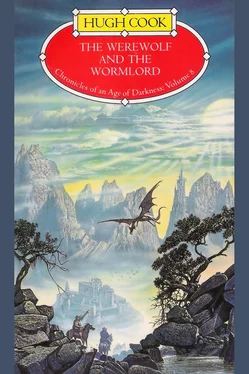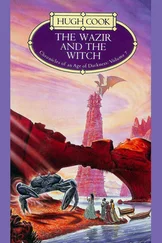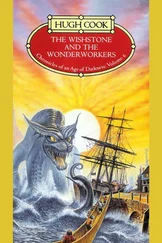Hugh Cook - The Werewolf and the Wormlord
Здесь есть возможность читать онлайн «Hugh Cook - The Werewolf and the Wormlord» весь текст электронной книги совершенно бесплатно (целиком полную версию без сокращений). В некоторых случаях можно слушать аудио, скачать через торрент в формате fb2 и присутствует краткое содержание. Жанр: Фэнтези, на английском языке. Описание произведения, (предисловие) а так же отзывы посетителей доступны на портале библиотеки ЛибКат.
- Название:The Werewolf and the Wormlord
- Автор:
- Жанр:
- Год:неизвестен
- ISBN:нет данных
- Рейтинг книги:5 / 5. Голосов: 1
-
Избранное:Добавить в избранное
- Отзывы:
-
Ваша оценка:
- 100
- 1
- 2
- 3
- 4
- 5
The Werewolf and the Wormlord: краткое содержание, описание и аннотация
Предлагаем к чтению аннотацию, описание, краткое содержание или предисловие (зависит от того, что написал сам автор книги «The Werewolf and the Wormlord»). Если вы не нашли необходимую информацию о книге — напишите в комментариях, мы постараемся отыскать её.
The Werewolf and the Wormlord — читать онлайн бесплатно полную книгу (весь текст) целиком
Ниже представлен текст книги, разбитый по страницам. Система сохранения места последней прочитанной страницы, позволяет с удобством читать онлайн бесплатно книгу «The Werewolf and the Wormlord», без необходимости каждый раз заново искать на чём Вы остановились. Поставьте закладку, и сможете в любой момент перейти на страницу, на которой закончили чтение.
Интервал:
Закладка:
But this was not to be.
For Alfric was still descending the slopes of Mobius Kolb when he was intercepted by a messenger who directed him to report to the Bank. This he did, though it meant a weary trek up to the heights.
The light of the Oracle of Ob shone strange and strong from the utmost peak of Mobius Kolb. Once again, Alfric felt the lure of that light. He was glad to escape inside, into the vestibule of the Bank, where once again he made the change from boots and leathers to robes and slippers.
To his surprise, Alfric was then directed to the office of Comptroller Xzu, a Banker Second Class who was responsible for Alfric’s supervision. Many feared Xzu, but Alfric did not. For he had something on Xzu; he knew Xzu had accepted bribes in the past, and, what’s more, he could prove it. If the need arose.
On arrival at Xzu’s office, Alfric received another surprise; for the office sent him on to the Survey Room, a hallowed chamber high in the Rock of Rocks, the gaunt donjon which served the Flesh Traders’ Financial Association as its ultimate stronghold. Only the mightiest managers of the Bank worked out of the Survey Room; and Alfric had never visited it before except to deliver messages.
To the Keeper of Secrets went Alfric Danbrog, ascending many weary stairs to reach the Survey Room. The habit of housing the high and the mighty in upper-storey rooms was neither practical nor desirable, but it was nearly unshakeable: even though it properly belonged to an earlier era when (this much the legends acknowledged, and more) dignitaries could be whisked to the heights by magical means or their mechanical equivalents.
At last Alfric reached the door guarding the final few stairs leading up to the Survey Room, negotiated his safe-passage with the guards who stood sentry there, then ascended to the utmost heights of the Keeper of Secrets and entered the Survey Room. This capacious office was lit by a full two dozen lanterns. It had four windows, each guarded by a single sheet of glass; but precious little could be seen of the world outside.
Comptroller Xzu offered his guest a little wine. Alfric sipped cautiously, tasting, testing. He calculated interest rates in his head, thus assuring himself that his mental faculties were not being subtlely impaired. Thus he had been taught by the Bank; for the Bank had dealings with people from many cultures, some of them renowned for the use of subtle and swift-acting poisons.
‘While you’re here,’ said Xzu genially, ‘you might care to admire the view.’
Alfric knew not whether his superior was drunk; or deluded; or was making a joke; or mistakenly thought the view to be of interest. Rather than try to puzzle out this conundrum, Alfric dutifully peered through the nearest window, which showed him mostly his own reflection. He looked closer, using his hands to screen out lantern light. He caught a glimpse of a malevolent red light flaring in the depths of his own eyes: and jerked away abruptly.
Had Xzu noticed his disconcertment? No. The Banker Second Class was engaged in pouring some more wine.
Xzu looked up.
‘What did you see?’ said he.
‘Not much,’ said Alfric, who felt under no compulsion to lie for the sake of politeness.
‘Ah,’ said Xzu. ‘A pity. You should come here by day. It’s a good view then. The bulk of Mobius Kolb stands between us and a perfect viewscape. Still, what we do see is remarkable.’
‘One suspects the vista is truly worthy of admiration,’ said Alfric cautiously. ‘Yet the fragility of glass is surely not entirely compatible with the requirements of security.’
‘This is,’ said Xzu.
And rapped his knuckles against the window, then invited Alfric to do likewise, which he did.
‘We bought these panes of glass three generations ago,’ said Xzu. ‘From the ogres of the Qinjoks, as it happens.’
‘Truly?’ said Alfric in wonderment. ‘I did not know they had such skill.’
His opinion of the ogres was thus much enhanced, though this enhancement was spurious. In point of fact, the ogres had not made those windows: they had found them. Each window had once been the windshield of a Raflanderk IV All-Terrain Assault Vehicle, a product of a civilization long since destroyed and forgotten.
‘What skills the ogres do or do not possess is a moot point,’ said Xzu, who rightly suspected the miraculous windows to be a relic of antiquity. ‘The point is,’ said Xzu, ‘the windows let us enjoy the view.’ Then, a little pointedly: ‘As it happens, I’ve often enjoyed the view.’
Only then, belatedly, did Alfric realize what Xzu was trying to tell him. Xzu was highlighting his long familiarity with the Survey Room. Xzu was making a power statement. Usually, Alfric would have picked up this subtlety immediately, without needing to have it hammered home. But renewed acquaintance with his father’s world had temporarily lessened the enthusiasm with which he usually attended to the nuances of conversation.
It would be overstating the case to say that rebellion stirred in Alfric’s heart. Still, on this occasion he found himself impatient with the posturing, the over-intricate manoeuvring and sidelong statements of oracular ambiguity which attended life within the Bank. For the first time in a long time, he found no delight in his own understanding of the shadings of suggestion and the implications of unstated comment.
‘Our masters live well,’ said Alfric.
This was a subtle statement in its own right; for Alfric was pointing out that there were powers in the Bank far greater than Xzu.
‘So they do,’ said Comptroller Xzu. ‘Happily, for the moment I share their privileges, since I have been temporarily raised to the rank of Banker First Class. I am also temporarily without peers, since our Masters are Elsewhere.’
Alfric knew the meaning of this, and was not so indiscreet as to ask ‘where’.
Instead, he sipped his wine and pretended to admire the view as Banker Xzu, temporarily a Master, continued the lengthy verbal preambles with which he was choosing to preface whatever business it was that he wished to conduct.
The Yudonic Knights of Wen Endex tend to see verbal intercourse as a form of rape, whereas the bankers view it more as an exercise of the arts of seduction. Hence, whereas the Knights will settle swiftly to the meat of a matter, the bankers are not so hasty. Rather, they choose to exercise their eloquence as if for its own sake. A procedure not without reason, for each Bank, by the nature of its Secret, is intimately connected with other great financial institutions in cultures greatly dissimilar from each other; which leads to the need for the diligent cultivation of delicacies of diplomacy, lest sensibilities be needlessly affronted when business is done.
At last Banker Xzu got to the point:
‘Sometimes in this life one finds oneself progressing towards quite unforeseen goals. Do you not agree?’
‘One would not lightly venture to disagree,’ said Alfric cautiously.
‘Furthermore, it is immature — is it not? — to be obsessionally addicted to a certain line of action. Surely flexibility is a mark of maturity.’
‘It has been said that firm resolution is admirable,’ said Alfric. ‘Nevertheless, I take your point.’
Then, to Alfric’s surprise, Banker Xzu produced a legal document some years old, and invited Alfric to read it. Of course he recognized it immediately. It was a treaty he had signed when he entered the Bank. The treaty committed Alfric to try (should the Bank so direct it) to win the throne of Wen Endex: but only if the Wormlord should die or should be appearing to die.
Alfric had signed that treaty because at the time (how could he have been so naive?) he had genuinely believed Tromso Stavenger to be immortal.
Читать дальшеИнтервал:
Закладка:
Похожие книги на «The Werewolf and the Wormlord»
Представляем Вашему вниманию похожие книги на «The Werewolf and the Wormlord» списком для выбора. Мы отобрали схожую по названию и смыслу литературу в надежде предоставить читателям больше вариантов отыскать новые, интересные, ещё непрочитанные произведения.
Обсуждение, отзывы о книге «The Werewolf and the Wormlord» и просто собственные мнения читателей. Оставьте ваши комментарии, напишите, что Вы думаете о произведении, его смысле или главных героях. Укажите что конкретно понравилось, а что нет, и почему Вы так считаете.












